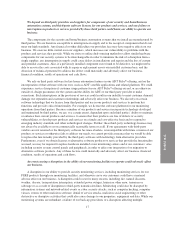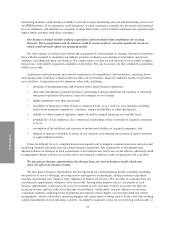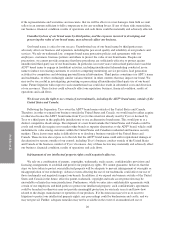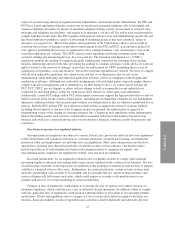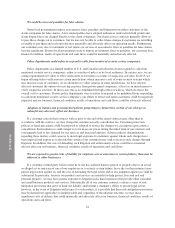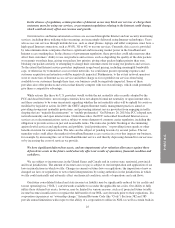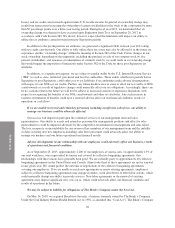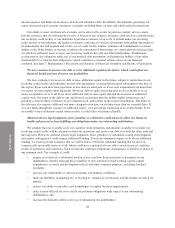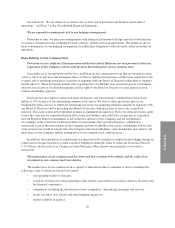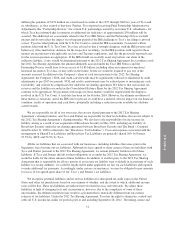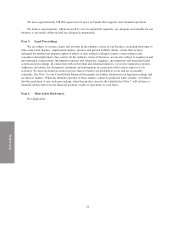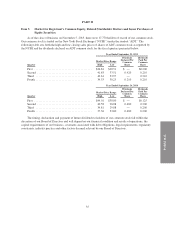ADT 2015 Annual Report Download - page 99
Download and view the complete annual report
Please find page 99 of the 2015 ADT annual report below. You can navigate through the pages in the report by either clicking on the pages listed below, or by using the keyword search tool below to find specific information within the annual report.
FORM 10-K
In the absence of regulation, certain providers of Internet access may block our services or charge their
customers more for using our services, or government regulations relating to the Internet could change,
which could adversely affect our revenue and growth.
Our interactive and home automation services are accessed through the Internet and our security monitoring
services, including those utilizing video streaming, are increasingly delivered using Internet technologies. Users
who access our services through mobile devices, such as smart phones, laptops and tablet computers, must have a
high-speed Internet connection, such as Wi-Fi, 3G or 4G, to use our services. Currently, this access is provided
by telecommunications companies that have significant and increasing market power in the broadband and
Internet access marketplace. In the absence of government regulation, these providers could take measures that
affect their customers’ ability to use our products and services, such as degrading the quality of the data packets
we transmit over their lines, giving our packets low priority, giving other packets higher priority than ours,
blocking our packets entirely or attempting to charge their customers more for using our products and services.
To the extent that Internet service providers implement usage based pricing, including meaningful bandwidth
caps, or otherwise try to monetize access to their networks, we could incur greater operating expenses and
customer acquisition and retention could be negatively impacted. Furthermore, to the extent network operators
were to create tiers of Internet access service and either charge us for or prohibit our services from being
available to our customers through these tiers, our business could be negatively impacted. Some of these
providers also offer products and services that directly compete with our own offerings, which could potentially
give them a competitive advantage.
While actions like these by U.S. providers would violate the net neutrality rules recently adopted by the
FCC and described below, most foreign countries have not adopted formal net neutrality or open internet rules,
and there continues to be some uncertainty regarding whether the net neutrality rules will be upheld by courts or
modified by legislative action. In 2009, the CRTC adopted Internet traffic management practices aimed at
providing stronger net neutrality protections, and preventing internet service providers from engaging in traffic
shaping that are “unjustly discriminatory” or “unduly preferential.” On February 26, 2015 the FCC adopted new
network neutrality and open internet rules. Under these rules, the FCC reclassified broadband Internet access
services as a telecommunications service subject to some elements of common carrier regulation, including the
obligation to provide service on just and reasonable terms. The rules also prohibit blocking or discriminating
against lawful services and applications and prohibits “paid prioritization,” or providing faster speeds or other
benefits in return for compensation. The rules are the subject of pending lawsuits by several parties. The net
neutrality rules could affect the market for broadband Internet access service in a way that impacts our business,
for example by increasing the cost of broadband Internet service and thereby depressing demand for our services
or by increasing the costs of services we provide.
We have significant deferred tax assets, and any impairments of or valuation allowances against these
deferred tax assets in the future could adversely affect our results of operations, financial condition and
cash flows.
We are subject to income taxes in the United States and Canada and in various state, territorial, provincial
and local jurisdictions. The amount of income taxes we pay is subject to our interpretation and application of tax
laws in jurisdictions in which we file. Changes in current or future laws or regulations, the imposition of new or
changed tax laws or regulations or new related interpretations by taxing authorities in the jurisdictions in which
we file could materially and adversely affect our financial condition, results of operations and cash flows.
Our future consolidated federal and state income tax liability may be significantly reduced by tax credits and
tax net operating loss (“NOL”) carryforwards available to us under the applicable tax codes. Our ability to fully
utilize these deferred tax assets, however, may be limited for various reasons, such as if projected future taxable
income becomes insufficient to recognize the full benefit of our NOL carryforwards prior to their expirations. If a
corporation experiences an “ownership change,” Internal Revenue Code (the “Code”) Sections 382 and 383
provide annual limitations with respect to the ability of a corporation to utilize its NOL (as well as certain built-in
25




